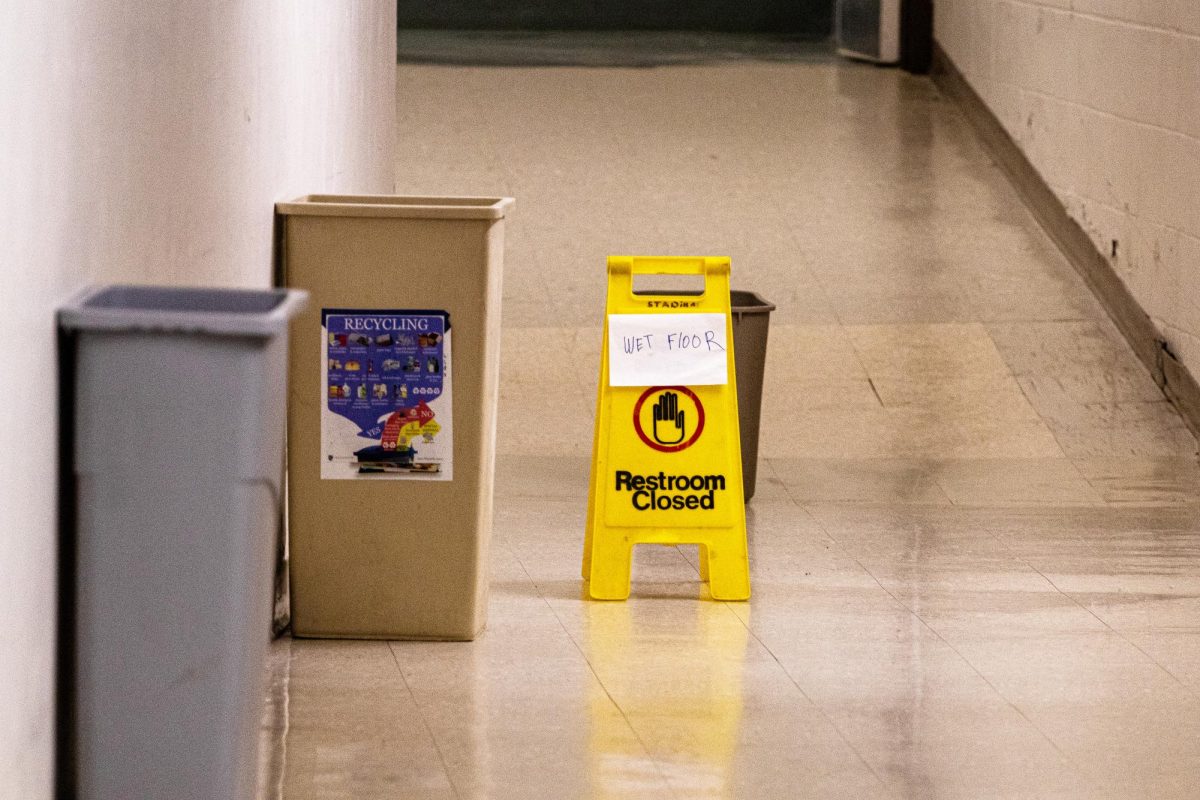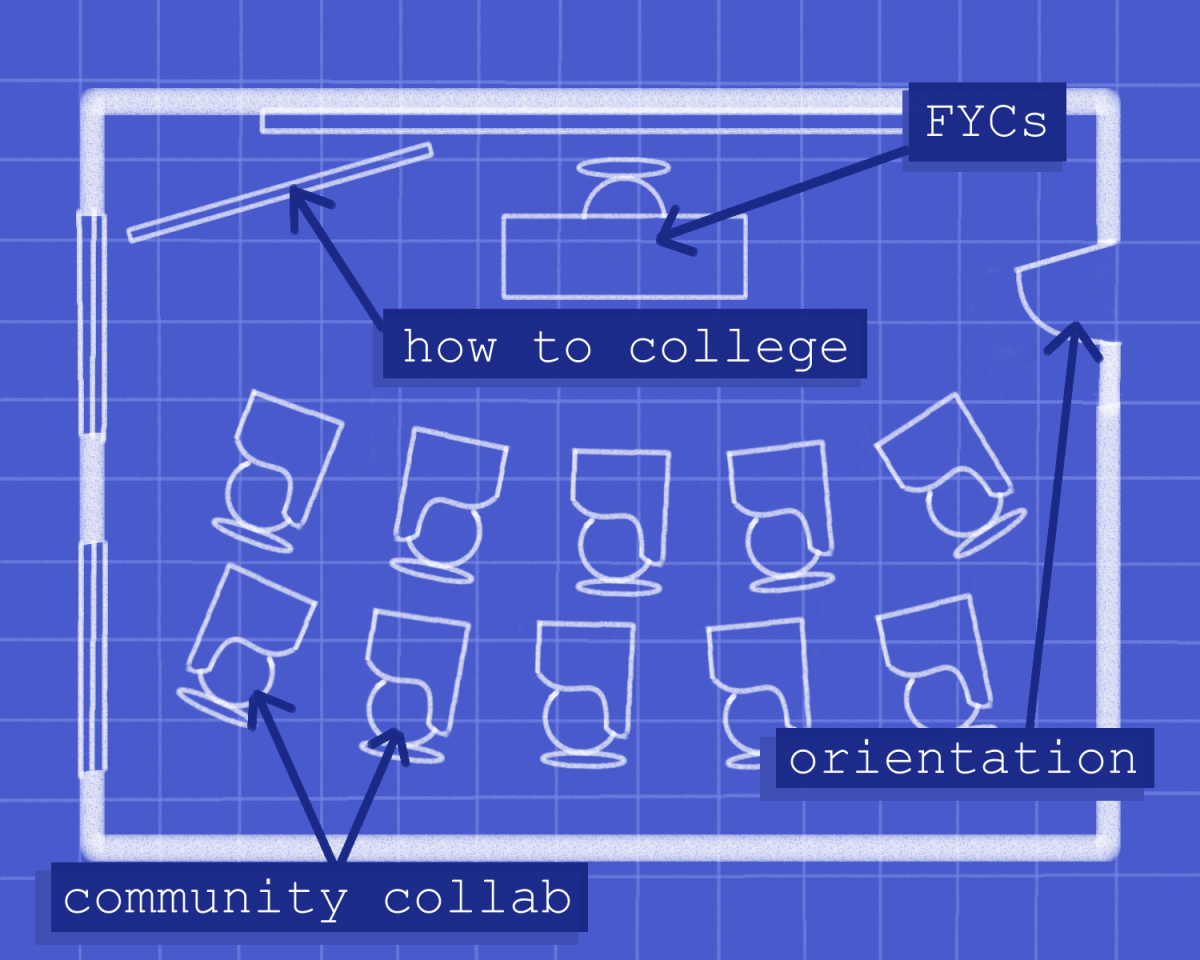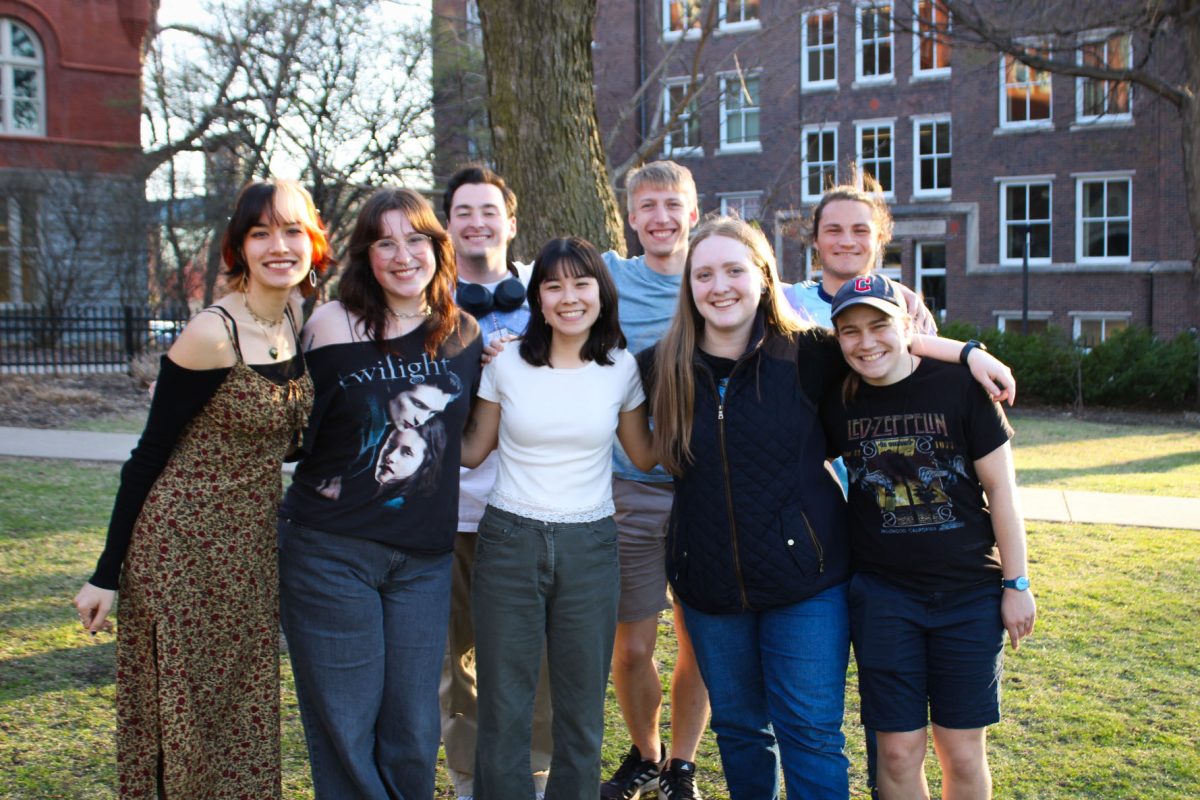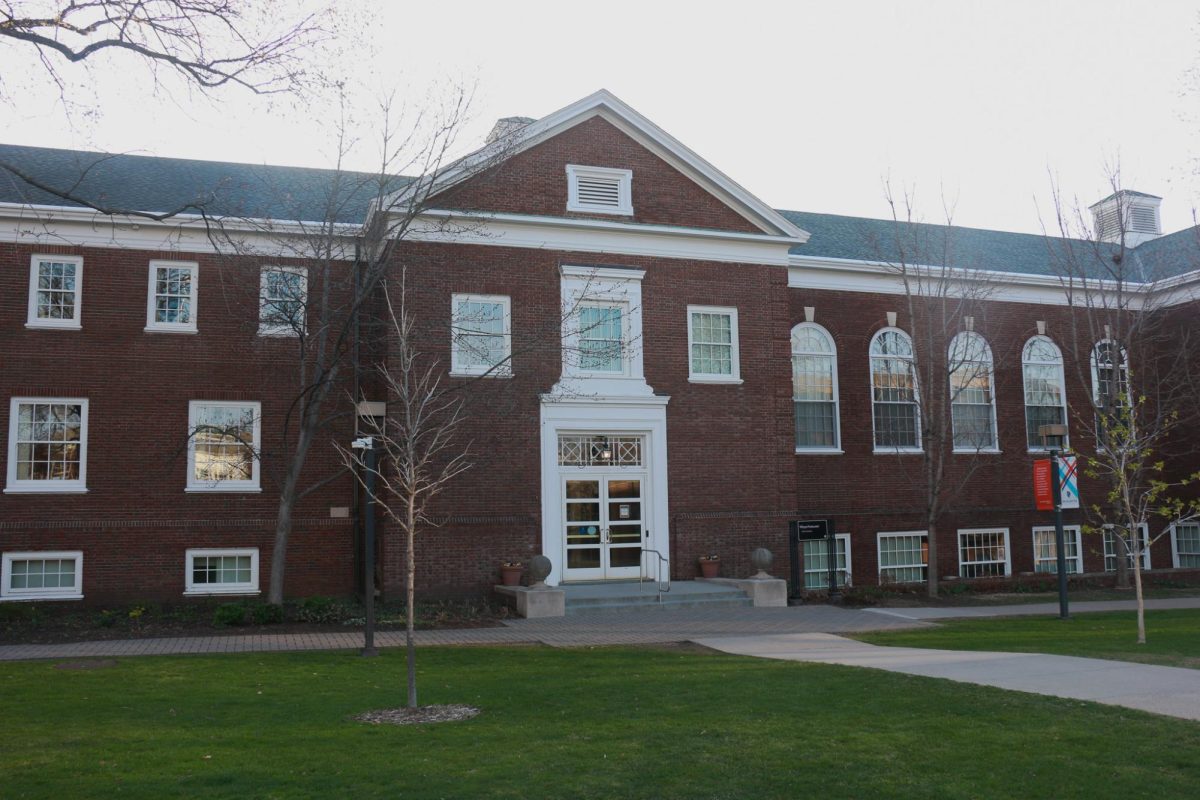Decomposition is at work all over Macalester’s campus. In kitchens, bathrooms, and central meeting spaces, waste is slowly being turned into “black gold,” otherwise known as compost.
As the school year kicks off, the composting program at Macalester has come into full swing. After the success of last semester’s pilot program, where four buildings on campus had compost bins installed, the program has expanded to include all of campus. These green-topped bins are now located in the common areas of non-residential buildings, kitchen spaces in the dorms, and bathrooms that have paper towel dispensers.
According to the Environmental Protection Agency (EPA), composting is nature’s way of recycling organic materials back into the soil through the process of decomposition. Although many products are compostable, these items are often unnecessarily thrown away and eventually end up in a landfill. In 2011, the EPA found that the United States generated more than 36 million tons of food waste and only four percent was diverted from landfills and incinerators through composting. Similarly, on an institutional level, Macalester found that 45 percent of the college’s trash is actually compostable through a waste sort in 2010.
And so students, faculty, the administration, Facilities and others on campus put their heads together to bring composting to campus. “Everyone has their hands in the cookie jar,” custodial shift supervisor Kyle Wright said.
A new movement
This solidarity around composting is relatively recent. Recycling was first becoming mainstream only 40 years ago; putting cans in a separate bin was still a novel concept. The environmental movement led the push for recycling all across the country, and institutions like Macalester jumped on the bandwagon. On Earth Day in 1970, Macalester’s recycling program was born.
Fast-forward to the present, and curbside recycling is ubiquitous across the U.S. Most people don’t think twice about recycling a glass bottle, and the recycling symbol has become iconic.
Today, the composting movement mirrors the history of recycling in the U.S. in many ways. For most people, throwing a banana peel in a compost bin rather than the trash can is still an unnatural move. But as metropolises across the U.S. begin to implement citywide curbside composting programs with cities like San Francisco and Portland taking the lead, the concept of composting is becoming increasingly popular and accepted.

Planting the seeds
Macalester’s composting program grew out of a larger goal to achieve Zero Waste by 2020. Rick Beckel ’15, a sustainability assistant at Macalester’s Sustainability Office, said that Macalester has spearheaded a number of initiatives to achieve this goal including purchasing recyclable and compostable dishes and cutlery; offering Onesies to students at the Library (homemade spiral notebooks made of recycled paper with printing on only one side); and facilitating swap and exchange programs since setting the Zero Waste goal in 2007.
“Composting is a very essential part of reaching [the Zero Waste] goal,” Beckel said. “It was only a matter of time before we worked with everyone to get everything to line up in the right place.” All of the food waste from Café Mac has been going to a pig farm for feed since 2008, but the rest of food scraps on campus and other compostable materials were thrown away in the trash until composting came to campus.
The move to single-stream recycling at the beginning of the 2012-2013 school year was a huge help in bringing the composting program to fruition, Beckel said. Single-stream recycling means that plastic, cardboard and glass do not have to be separated and can all be thrown in the same bin. Beckel said that this opened up another spot in the main buildings for compost bins, thus avoiding additional work for custodians. “Recycling has been around for a long time, but condensing to single-stream makes it easier for everyone,” Beckel said.
Scaling up
A pilot composting program was implemented in four locations in the winter of 2013 and as of the beginning of this academic year, the program has expanded to include all campus buildings. Facilities executed the expansion this summer with the help of student workers. They did a walk-through of buildings on campus, identifying all the possible locations where either paper towels or food waste would be thrown away, and put bins and compost signs in each of these locations.
Facilities organized a meeting with all of the custodians explaining the changes and providing a lesson on what is compostable and what is not. Sustainability Manager Suzanne Savanick Hansen brought a jar of soil to the meeting to show what compost looks like in its truest form. “It was super dark and rich,” Wright said. “You could just tell it was amazing dirt.”
In addition to the small bins throughout the campus buildings, there are several 90-gallon containers where custodians unload the contents of the smaller bins. When these larger containers reach capacity, they are brought to the main dumping site on campus, a large container on the corner of Snelling and St. Clair behind the Veggie Co-Op. This is where Macalester’s waste disposal contractor Allied Waste picks up the compost. The compost is brought to the Mulch Store in Empire Township, where it is mixed with compost from all over the Twin Cities and sold to landscaping companies.
Smelling for a good cause
So far, all seem to agree that the composting program is off to a great start. There is increasing awareness and dialogue on campus about composting, according to Abaki Beck ’15. “This year compost bins became a lot more visible,” Beck said. “It seems hard to avoid composting [on campus].”
But that doesn’t mean that there haven’t been glitches along the way. Although compost is taken out every day or every other day, Wright said that he has heard various complaints around campus about the smell. In the dorms, he said, you’re inevitably going to have food composting for 18 to 24 hours before it is picked up.
Wright believes that you have to think of the smell in a positive light. “It’s smelling for a better cause!” he joked. “At least it’s not going to landfill. But it’s new to a lot of people and it’s going to take time to get used to.”
The issue of smell also arose last semester during the pilot program, when a Daily Piper announcement was sent out to students about smelly compost being brought to campus.
The announcement said that students were bringing compost from their homes or dorms to bins on campus and that the smell was affecting people working and studying in those areas. “We are asking that you be respectful toward the people who may be affected by your ‘smelly’ composting,” it said, recommending that students bring their compost in compostable bags to prevent the smell issue.
Meg Reid ’14 said she was surprised when she received the Daily Piper announcement. She was living off campus with friends and they had been bringing their compost in brown paper bags to the compost bin on the first floor of the Campus Center. They were under the impression that the cans were emptied often and weren’t in areas where people hung out.
In response, Reid sent an email asking where compostable bags could be purchased. “She made it seem like the composting bags would be expensive, so we stopped composting,” Reid said. That was last semester and their house hasn’t composted since. Reid has stayed optimistic, though, and hopes that they can resume composting soon. “I would love it if we could easily compost on campus—the system already exists, and it seems like it would be relatively simple to set up a place to collect off-campus compost materials,” Reid said.
To fend off confusion, Facilities and the Sustainability Office now encourage the off-campus community to bring their compost to the two main compost dumpsites on campus—one on the south side of campus on the corner of Snelling and St. Clair behind the Veggie Co-op and one on the north side in the parking lot next to Patagonia. As opposed to the smaller bins in the academic buildings and dorms, bringing the off-campus compost directly to the outdoor dumpsites does not create any more work for Facilities, Wright said. And this way it doesn’t matter that it smells, Beckel said.
To compost or not to compost
Beckel urged the off-campus community to bring their compost to the two main outdoor dumpsites, but emphasized that students must be cognizant of what can be composted and what cannot so as not to muddle the current system. “Facilities is vital to make this program successful,” he said. “We need to be really respectful of Facilities to make sure of the long-term success of the program by following the system to a tee and making sure we’re composting the right things.”
Beckel continued that, unlike backyard composting, an industrial composter can break down many more products. All food scraps (including meat and dairy), non-recyclable paper products (paper towels, napkins, paper bags, paper cartons, etc.), coffee grounds, compostable dishware and pizza boxes can all be composted. “Anything that was once made of living things, it’s all compostable. It all breaks down to the same stuff,” Beckel said. But plastics, Styrofoam, oil, condiment packets, chip bags and candy wrappers are a no-go.
Maria Langholz ’14, the Sustainability Student Coordinator, said that one of the main challenges for students is that their perception of composting is often based on the backyard variety which is more limited in scope than institutional composting. Backyard composting doesn’t include meat, dairy or any of the paper products. “It’s hard to restructure how you think about compost,” Langholz said.
As Langholz was talking, a student walked by and threw an orange peel in the trash. “Ideally, she’s walking inside and there would be a compost bin right there and clear messaging that’s the same wherever you go,” Langholz said. The Sustainability Office is continuing to work on its consistent messaging throughout campus that makes it easy for people to do the right thing.
Wright emphasized that paper towels are one of the main products that get thrown in the garbage when they could instead be composted. He said to spread the word and say something if you see someone throwing away a paper towel: “Hey! You know that’s compostable, right?” Wright joked.
A cultural change
These interpersonal interactions are crucial for creating a composting culture on campus. Beckel said that although Macalester’s institutional endorsement of composting is crucial, students are key in making the program as successful as possible. “When it comes down to people using the system in the wrong way, it takes small-scale action and one-on-one conversations,” Beckel said.
Among our generation, many people see composting as a liberal, hippie activity. Part of changing people’s behavior is making them understand that composting has benefits for everybody, including the college as a whole, according to Langholz. Unlike trash, compost is not taxed, so Macalester has the potential to save money through composting.
This behavior change will occur naturally as people begin to see the composting bins around campus and see their fellow students composting, according to Beckel. “If we can make this something that is normative and is a natural behavior for first year students, they will carry that with them for the rest of their time here and that will ensure the long-term success of the program.”
But it goes beyond just students’ time at Macalester. Once students become accustomed to composting on campus, they will carry these ideas wherever they go after Macalester. “If people bring this knowledge and behavior out into the world, that’s going to catalyze a lot of change.”
From cradle to grave
Although composting and recycling are important steps to achieving Macalester’s Zero Waste goal, there is still a lot more to learn about where our trash is going. “The waste fight isn’t over until we know where everything goes from cradle to grave.”
Students should be making purchasing decisions that cut down on their need to compost or recycle anything at all, according to Beckel. “I like to see people carry their lunches to school in repurposed yogurt containers rather than dumping them in the recycling, bring their unwanted binders to the free swap rather than throw them away, and give their unwanted sandwich to a friend rather than compost it,” Beckel said. “Also, people should eat their apple cores.”
These long-term visions of more transparency in our waste disposal system are important, but for now the implementation of the composting program has been a great short-term success. “Even though we’re a small campus, I think it will make a big impact,” Abaki Beck said.







Dominic McLean • Sep 11, 2019 at 12:48 pm
I’ve learned a few important things via your post. I would also like to state that there may be situation where you will have a loan and do not need a cosigner such as a Federal Student Aid Loan. When you are getting that loan through a classic lender then you need to be ready to have a co-signer ready to make it easier for you. The lenders can base their decision using a few elements but the largest will be your credit score. There are some loan merchants that will in addition look at your work history and decide based on that but in many instances it will be based on on your ranking.
Lisa Fraser • Sep 10, 2019 at 7:13 am
Hey there! Do you use Twitter? I’d like to follow you if that would be ok. I’m absolutely enjoying your blog and look forward to new updates.
Ruth Chapman • Sep 5, 2019 at 6:17 am
You really make it appear so easy together with your presentation but I to find this topic to be actually one thing which I believe I’d never understand. It sort of feels too complex and extremely huge for me. I’m looking ahead on your subsequent post, I’ll attempt to get the hang of it!